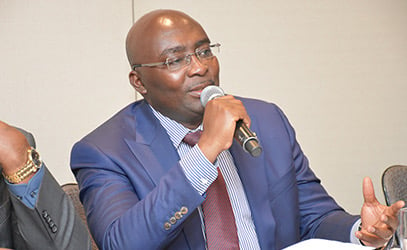Dr. Mahamudu Bawumia, the former Vice President of Ghana and the 2024 presidential candidate for the New Patriotic Party (NPP), has refuted claims that his Muslim faith played a role in the party’s defeat in the 2024 general elections. He asserted that Ghanaian voters do not typically reject a candidate solely based on their religious affiliation, emphasizing that such claims are unsubstantiated by data and lack merit. Bawumia highlighted his resounding victory in the NPP’s presidential primaries, where he competed against nine Christian candidates, as evidence that religion was not a decisive factor in the general election outcome. He underscored the fact that despite being the only Muslim candidate in the highly competitive primaries, he secured the overwhelming support of the party delegates. This, he argued, demonstrated that the NPP membership base was not prejudiced against his religious background.
Bawumia’s address, delivered at the commencement of the NPP’s post-election “Thank You” tour in Accra, aimed to dispel the narrative that his religion was a significant contributing factor to the party’s loss. He pointed to the myriad of explanations being offered for the NPP’s defeat, many of which he deemed to be speculative and lacking empirical basis. The former Vice President specifically addressed the allegation regarding religious bias, characterizing it as inconsistent with the Ghanaian political landscape, which he believes is largely tolerant and accepting of diverse religious beliefs. He contended that the suggestion undermined the sophisticated nature of Ghanaian voters and their capacity to assess candidates based on their qualifications and policy platforms rather than their religious identity.
The NPP entered the 2024 elections with the ambitious goal of “breaking the 8,” a reference to the established pattern of alternating power between the two major political parties, NPP and the National Democratic Congress (NDC), every eight years. However, the party suffered a significant defeat, losing to the NDC’s John Dramani Mahama by a margin of over 1.7 million votes. This electoral setback also resulted in a significant reduction in the NPP’s parliamentary representation, dropping from 137 seats to 88, a loss of nearly 50 seats to the NDC. This dramatic shift in parliamentary power gave the NDC a near two-thirds majority in the House, significantly altering the political landscape.
Analyzing the election results, Bawumia noted a stark contrast in the voting patterns. While the NPP experienced a substantial decline in its vote share, losing approximately 2.1 million votes compared to the 2020 elections, President Mahama’s vote count only increased by slightly over one hundred thousand votes. This disparity suggests that the NPP’s loss was not solely attributed to a surge in support for the NDC, but rather a significant erosion of the NPP’s own voter base. Bawumia postulated that this erosion stemmed from a disconnect between the party and its grassroots supporters. He underscored the urgent need for the NPP to re-engage with its base and regain their trust and support in order to rebound from this significant electoral setback.
Bawumia’s argument centers around the idea that attributing the NPP’s loss to his religious affiliation is a simplistic and misleading explanation that overlooks more fundamental factors. He suggests that the party’s defeat was more likely a result of broader political dynamics, potentially including dissatisfaction with the NPP’s governance, economic conditions, or the party’s campaign strategy. By focusing on his own religious identity as a purported reason for the loss, Bawumia implies that these other critical factors are being overlooked. He advocates for a more thorough and data-driven analysis of the election results to accurately understand the reasons behind the NPP’s defeat and to formulate effective strategies for future electoral success.
Re-establishing a strong connection with the grassroots, Bawumia emphasized, is crucial for the NPP’s revival. He believes that the party needs to actively listen to the concerns of its supporters, address their needs, and demonstrate a genuine commitment to their well-being. By re-engaging with the grassroots and rebuilding trust, the NPP can begin the process of regaining the lost ground and positioning itself for a stronger performance in future elections. This emphasis on grassroots engagement suggests that Bawumia recognizes the importance of rebuilding the party from the ground up, focusing on the core supporters who form the foundation of the NPP’s electoral strength. By prioritizing these relationships, he aims to solidify the party’s base and create a more resilient and sustainable political force.














